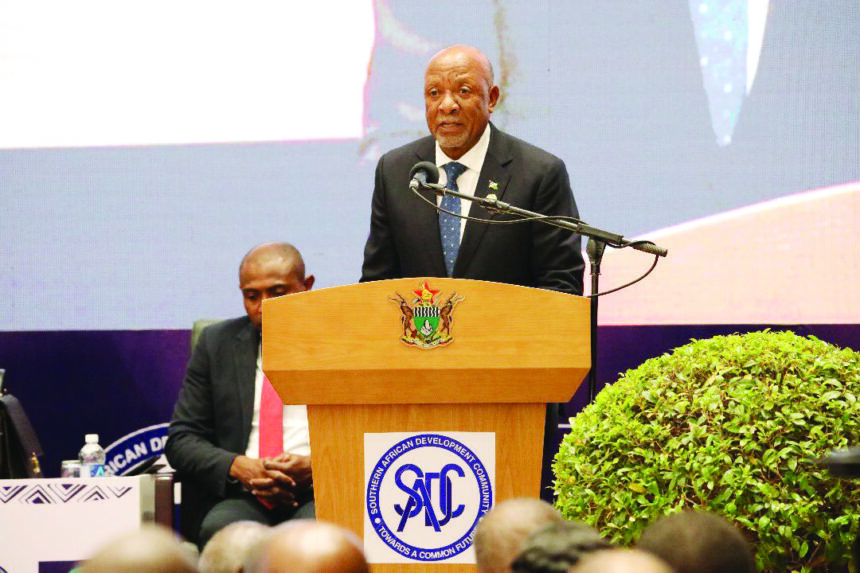President Nangolo Mbumba has renewed Namibia’s commitment to fostering trade, economic integration, people-to-people exchanges and peace to build a prosperous Southern African Development Community.
He said SADC should continue to prioritise dialogue and reconciliation to ensure peace prevails for development and prosperity to flourish, and to end violence and instability by recognising strength in unity and solidarity.
“We should continue to enhance trade relations, harmonise policies and invest in infrastructure development to unlock the vast potential of our region,” said the Namibian statesman on SADC day at the weekend in Harare, Zimbabwe.
Years ago, southern African nations with shared aspirations of peace, stability and prosperity came together to establish SADC. Mbumba said Namibia’s accession to SADC underscored the commitment to regional cooperation, solidarity and aspirations for shared prosperity and sustainable development.
He added: “SADC has been instrumental in promoting collaboration among its member states, enabling us to work together towards common goals that benefit our economies and people. Over the years, SADC has evolved into a vibrant community by implementing various protocols and agreements.”
At the 44th ordinary SADC summit of heads of state and government, Mbumba gave an assurance that he will continue from where his predecessor left off by remaining committed to the goals and principles of the regional organisation, and the aspirations of the people.
“I will tirelessly endeavour to play my part in ensuring that their dreams and hopes for a better future will materialise into a region characterised by peace, unity and economic prosperity,” he said.
Mbumba noted that the region still faces persistent security challenges in the Democratic Republic of Congo, following the resurgence of conflict and activities of armed groups, including the M23.
This is a source of great concern for the region, as it poses a potential threat to regional peace and security.
“It, therefore, requires a collective effort and stronger political will for us to ensure peace comes to the people of the DRC,” he noted.
Trading
The executive secretary of SADC Elias Magosi said to date, intra-regional trade stands at a low 23%, signifying that as SADC member states, “we are trading more with the rest of the world than we do among ourselves.”
“One of the culprits driving these low levels of intra-regional trade is the usual non-tariff barriers. Despite zero import duty on 85% of products traded among SADC member states, intra-SADC importers and exporters continue to encounter new and longstanding unresolved non-tariff barriers”, he added.
It is, therefore, imperative to rededicate collective efforts to implement measures to reduce these barriers, and promote intra-regional cooperation and integration.
Magosi said the benefits of an enlarged regional market to the SADC economy and citizens cannot be overemphasised. The collective market of 389 million people and a combined gross domestic product of US$841 billion (N$15 trillion) provides enormous potential for trade and investment opportunities, as well as economic growth.
New leadership
Taking over the SADC chairmanship from Angola, Zimbabwe’s president Emmerson Mnangagwa said he was taking over the mantle with humility and grace, and looks forward to the invaluable support and drawing from vast experiences and counsel to advance the regional agenda for the benefit of SADC citizens.
This year’s theme ‘Promoting Innovation to Unlock Opportunities for Sustainable Economic Growth and Development Towards an Industrialised SADC’, brings to the fore the role of innovation in sustained economic transformation and development.
“It has become critically important and urgent to harness the potential of innovation to produce goods and services through value-addition and beneficiation of our rich mineral and related natural resources,” said Mnangagwa.
He observed that the fourth Industrial Revolution continues to impact and transform “the way we operate and execute our work”.
“Our SADC bloc cannot afford to fall behind in the new and fast-changing frontier of science, technology and innovation. These aspects are a prerequisite for increased productivity, and indeed the bedrock upon which other parts of the world industrialised and developed,” he indicated.
-psiririka@nepc.com.na



